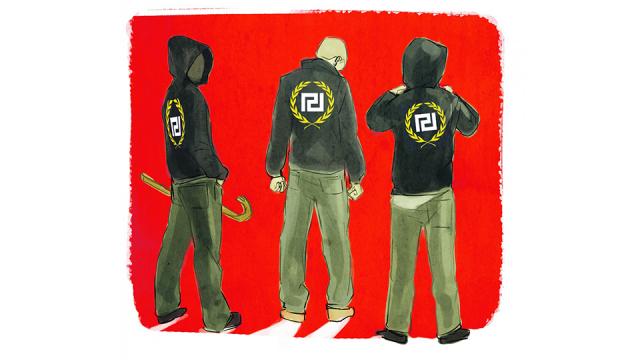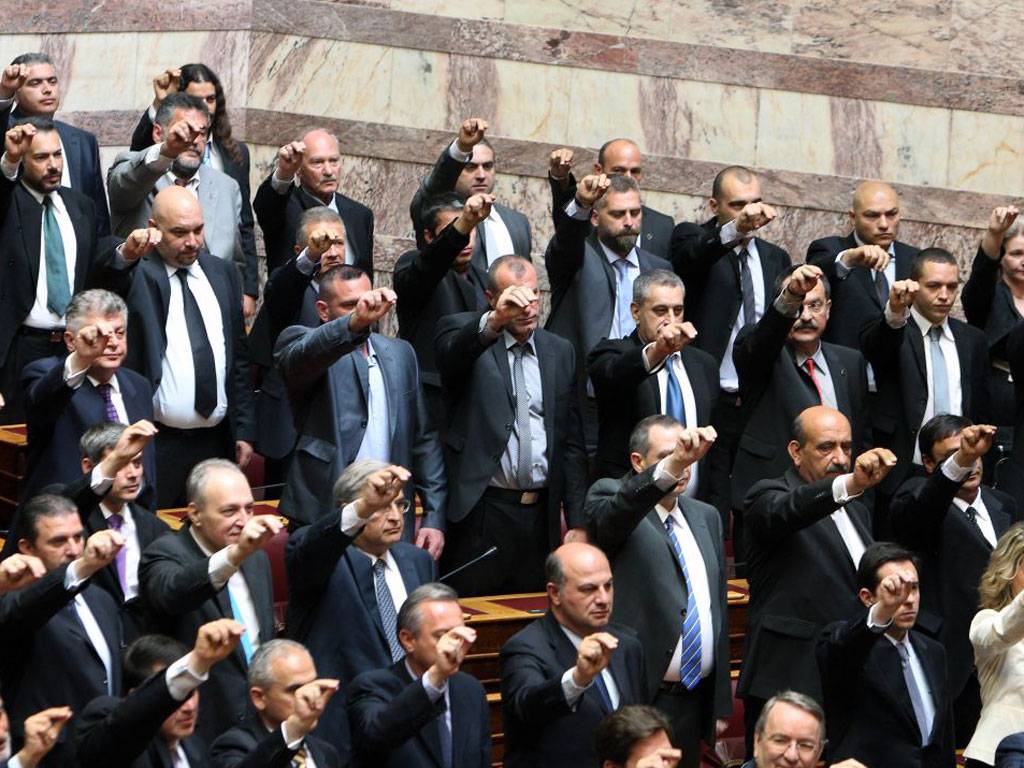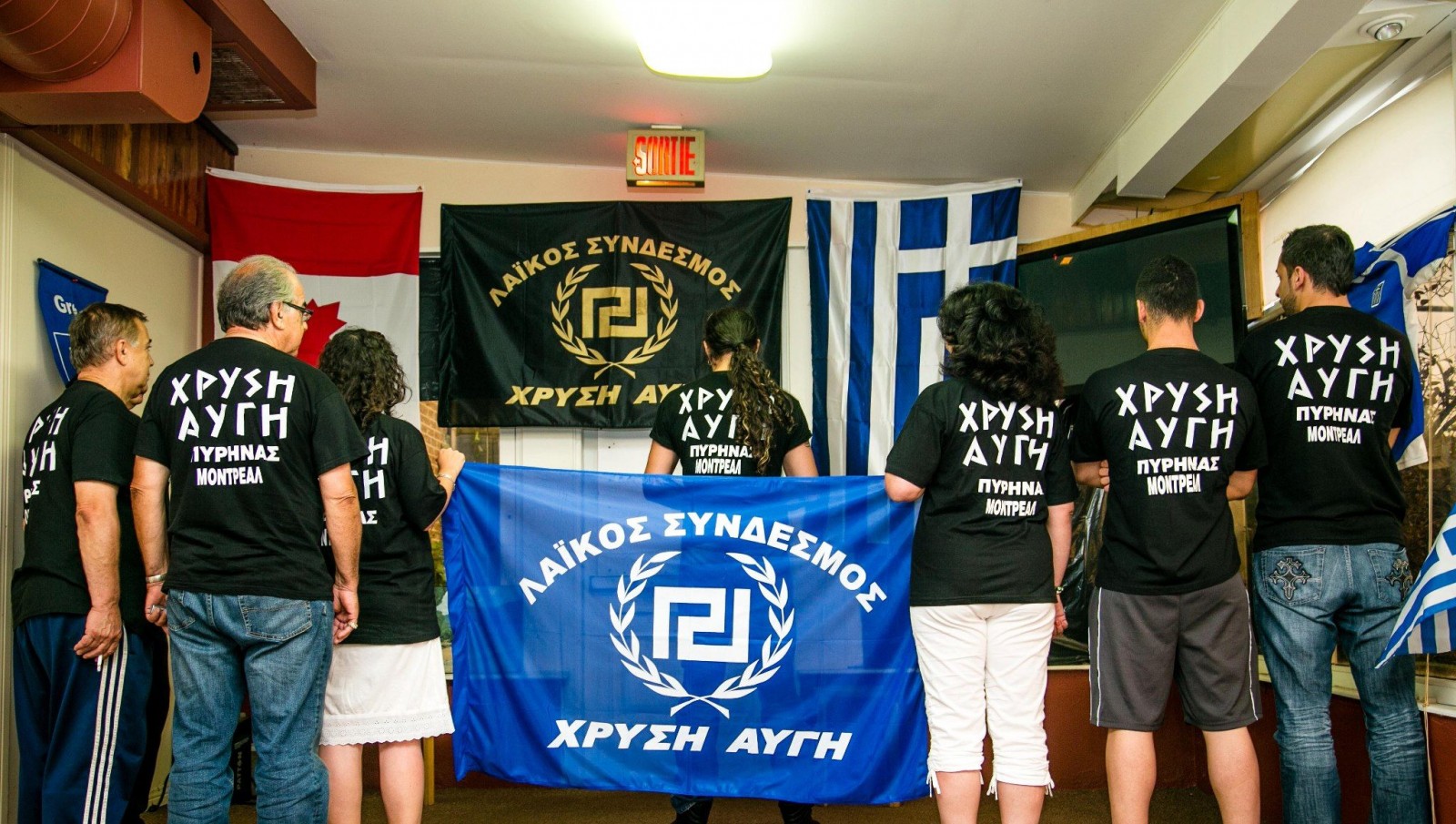
“I don’t talk about the Party. Don’t want to. Sorry.”
So read the text message from my sole contact with a Golden Dawn voter. The sender, a young man in his early twenties; the recipient, my friend who had loosely arranged a meeting in anticipation of my arrival in Athens. I had heard that the voter had changed his mind about the meeting and I had asked my friend to phone him. Following a series of unsuccessful attempts to get through, my friend received this message.
The message – “I don’t talk about the Party” – had a Soviet tinge to it, evoking a state of silence and paranoia. It is representative of the climate in a Greece where, after the coalition government, a neo-Nazi party holds the second largest share of the votes and journalists are treated with suspicion and, often, contempt. More specifically, the message served as a foretaste for the difficulty I would have in obtaining an interview with anyone connected to Golden Dawn.
One evening, after finding Golden Dawn’s head office closed, I wandered up to Agios Panteleimonas Square, an immigrant hub and the site of many of Golden Dawn’s racist attacks. The square’s eerie silence was punctuated by the echoing thuds of a football being kicked around the churchyard by a group of Greek kids. The few people out on the streets stopped talking as I passed by.
I stopped to peer in through a café window. In a back section, beyond a smattering of elderly customers, a dense group of men dressed in black were engaged in serious debate. They looked up and I walked on. I subsequently discovered, from someone who had called me “stupid” for going to Agios Panteleimonas alone, that this café was a Golden Dawn hangout.
On the way back to the station I passed through the smaller Attikis Square. The word ELLAS – Greece – had been painted on the ground in blue and white at each of the square’s four entrances. Greek flags fluttered from lampposts where they had been sellotaped by some DIY patriot. In the center of the Square, Golden Dawn’s swastika-like symbol was spray-painted onto the fountain. I began taking photographs when a woman started shouting at me. I approached her. “Don’t take my photograph!” I put my camera away. “Where are you from? Italy? Spain? Egypt?” “London,” I said, which soothed her. “Oh, okay.”
As I was leaving the square, I received information that a senior member of Golden Dawn was about to give a talk in the suburbs so I headed across town to the party’s Nikaia office.
In Nikaia, at the edge of the block where the party office was located, a police car was barricading the residential road. In addition to three police officers who lingered around their car, the barricade was manned by eight Golden Dawn members dressed in military fatigues and black jumpers bearing their party logo. All had shaved heads. In the middle of the street, beyond the roadblock, the rally of about fifty Golden Dawn supporters was taking place.
I approached one of the Golden Dawn members blocking the road, told him I was a journalist and asked if I could pass. He went off to the rally and came back with another shaven-headed man. I asked him the same question and he went to fetch a third person. This third man was unlike the others. In his fifties with fluffy hair, a moustache, glasses and an anorak, he had an affected air of cordiality about him and reminded me of an old professor of mine. He asked for my press pass. I told him I didn’t have one. He asked if I wrote for the left or the right. Neither, I said. I was a cultural journalist. “Do you write for the Guardian?” “No,” I replied emphatically, aware of the paper’s stigma amongst the Greek right following its revelations of anti-fascist protesters being beaten in police headquarters.
“Do you mind if I ask you your name? My name’s Georgios,” he said, placing his palm on his breast. I told him my first name in return. “And your surname?” I reluctantly told him. He went off to ask a higher authority if I could pass. As he returned, I caught him taking a photo of me. “I’m afraid it’s not possible now, but maybe in half an hour, after the talk.”
I decided to go for a walk. I headed up the dark street and onto a main road. I walked for ten minutes before remembering the Dictaphone in my jacket pocket. I was about to switch it on in an effort to at least record some exchanges when I turned and saw the second skinhead I had spoken to standing across the street in the shadows, watching me.
I turned around and headed back to the rally, pretending not to have noticed my stalker. As I neared the rally I realised that if, in my absence, the genial professor had searched for my name on the internet, he would have found it attached to two left-leaning publications along with photos of me modelling as Maria Callas: not the best way to ingratiate oneself with an ultra-right, homophobic bunch of thugs.
Back at the barricade, the police car drove off and was replaced by a wheelie bin and more Golden Dawn sentries. The way the fascists seamlessly took over from the police would seem to be significant here.
“Members of Golden Dawn do illegal things every day but they are not being arrested by the police because they are friends,” says Voula Giannakopoulou, a lawyer who defended four of the protesters assaulted in police custody. “Most of the police officers in Greece voted for Golden Dawn. They see Golden Dawn as doing the parts of their job that they can’t do – because the law doesn’t allow them to beat refugees or to kill people. But they let Golden Dawn members do everything they want.”
The reluctance to talk about Golden Dawn is not restricted to the party itself. “Until recently we thought this whole Golden Dawn thing was a bit funny – just some guys thinking a lot of themselves,” a musician in her twenties told me. “I’ve never lived in a dictatorship and I always used to speak out loud… Things are censored. It’s scary.” This woman, along with almost everyone else I spoke to, did not want to be named.
At a bar in the city center I was speaking to a young lawyer whose firm has represented immigrant victims of Golden Dawn attacks. I asked if she had any stories to tell me. “Yes,” she replied. “But I don’t really want to say. Other people have more violent stories.” During my time in Athens, this response was a regular refrain.
I put it to Voula Giannakopoulou that Greeks are becoming desensitised to Golden Dawn’s aggression, that a base level of violence has become the norm. “The situation with Golden Dawn is very ugly here. They beat foreigners, refugees, every day. Or leftists or anarchists. So if somebody just gets insulted by Golden Dawn, it’s nothing for them. Or if they’re beaten, but not very severely injured, it’s not a big thing. It’s something very, very common. It happens every day.”
Over the course of my stay, along with all the official routes I took to procure interviews (which proved fruitless), I came across two further people who knew Golden Dawn members who’d be willing to talk to me but nothing materialised. One of my contacts requested that I assure them that I would not write anything negative about the party, which I could not. The second contact gave me a mobile phone number. I dialed it constantly for three days running. No one ever answered.
Towards the end of my stay, I discovered that Ilias Kasidiaris, the Golden Dawn politician who struck a female MP during a television debate, would be talking at the party office in a square in Artemida, just outside Athens. Other Golden Dawn events advertised to take place in the neighbourhood that day included the opportunity to donate blood to a blood bank “only for Greeks”.
On my way, I stopped to interview two left-wing female activists. I learned that Golden Dawn’s leader, Nikolaos Michaloliakos, had issued a moratorium on speaking to foreign journalists which explained my difficulties in securing an interview. The two women spent a large portion of the interview trying to persuade me not to go to Artemida, warning me that I looked like an anarchist.
I nevertheless caught the bus to Artemida where the square was being patrolled by uniformed Golden Dawn members with walkie-talkies. There was no one else about. The talk must have just finished as the party faithful were pouring out of the building. Amidst a large number of hard-looking skinheads were elderly couples, women and children. They were chatting as if it were the end of a church service. Many, including the uniformed skinheads, were eating ice cream.
Having learnt from my experience in Nikaia, I misrepresented myself to one of the doormen and asked him if I could interview someone. He checked inside and told me to follow him. On the way up the stairs he told me I was not allowed to record anything.
I was led through the crowd, down a corridor, to an office. The doorman stood by the window and an older party member sat behind a desk upon which rested a metallic model of a Spartan helmet. “You must not record anything,” I was reminded. “May I take notes?” I asked, opening my notebook. “No,” came the blunt response. A third member entered silently and stood by the door and I was asked for identification. I handed over a British Library card which was observed with curiosity.
When the interview came to an end, I asked the man behind the desk for his name. He declined. Instead, he gave me a Golden Dawn business card. It contained no personal information, only the office email address and telephone number. I was told that if I wrote to that address I would be able to put questions to a Golden Dawn politician. I wrote the next day but, to date, am still awaiting a response.
A few days previously I had asked the young lawyer in the bar what action was being taken against Golden Dawn. “Not enough,” she had said, frustrated. “We should be acting now before it’s too late.”
“We’re not as active as we should be,” the musician had agreed. “There’s something really weird about this nation. We don’t succeed in doing lots of things but when something gets really tough we somehow get together and protest and something happens. We work well together only under pressure. If there’s not enough pressure we don’t do anything.” I suggested, half-jokingly, that maybe it’s a Greek trait to wait till the last second. “Yeah,” she said. “Then we explode.”
It must be hoped that any such explosion comes as soon as possible. From what I saw, the culture of self-imposed silence that has crept, or rather swept, in across Greece in the wake of Golden Dawn’s ascent, is preventing widespread counter-organising taking place. Both sides, for different reasons, choose not to speak out. But in the midst of the prevailing silence, Golden Dawn continues to act.
Originally published by The Occupied Times of London.
3 WAYS TO SHOW YOUR SUPPORT
- Log in to post comments













